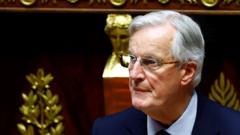France’s Political Crisis Deepens as Prime Minister Faces No-Confidence Vote
France is experiencing a significant political upheaval after Prime Minister Michel Barnier used special constitutional powers to force through a controversial budget without parliamentary approval, pushing the country’s minority government to the brink of collapse.
Barnier invoked Article 49.3 of the French constitution to push through social security reforms and a budget bill aimed at addressing France’s growing deficit, after failing to secure sufficient parliamentary support. The €60bn (£49bn) budget proposal included tax rises and spending cuts, which Barnier had already modified to address some initial criticisms.
The political crisis stems from the summer’s snap elections, which resulted in a hung parliament with no party holding an absolute majority. A left-wing alliance won the most seats, leaving Barnier in a precarious position from the outset. Despite making last-minute concessions—including scrapping planned electricity tax increases and adjusting prescription drug reimbursement policies—the opposition remained unsatisfied.
Immediately following Barnier’s unilateral budget implementation, opposition parties from both the left and far-right announced their intention to file no-confidence motions. The France Unbowed (LFI) party and Marine Le Pen’s National Rally (RN) are leading the charge against the government.
Barnier defended his actions, telling MPs that he was prioritizing national interests over partisan politics. However, opposition leaders strongly disagree. Mathilde Panot, LFI’s president, argued that Barnier’s government has created political chaos, and Nathalie Oziol described the situation as a “deep, huge political crisis.”
If the no-confidence vote succeeds, potentially as early as Wednesday, Barnier would remain as a caretaker prime minister until President Emmanuel Macron announces a new government. The potential outcomes include:
1. A new majority government (considered unlikely given the current parliamentary fragmentation)
2. A technocratic government to guide the country until new elections
3. Prolonged political uncertainty
The process could take weeks, similar to the aftermath of the summer’s snap elections. Some political parties are also calling for new presidential elections, though Macron is currently scheduled to remain in office until 2027.
The immediate consequence of a successful no-confidence vote would be the failure of the budget bill, further complicating France’s financial landscape.
This political turmoil highlights the challenges facing France’s governance in a fragmented parliamentary system. Barnier, previously known for his role in Brexit negotiations, now finds himself at the center of a potential governmental collapse, with opposition parties united in their desire to remove him from power.
The coming days will be crucial in determining the future of France’s political leadership and economic direction.




